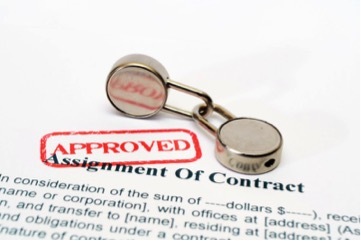
When you're doing no rehab or other work on a home you're flipping, wholesaling is a term many use. You're locating a deep discount deal that has enough difference between what you'll pay to buy/control it and what your buyer will pay for it to allow you some profit in the middle. Your value in this type of deal is purely in your ability to locate and lock up properties your buyers either can't find or do not want to spend the time and effort to find.
Let's use the example of your search for a property to flip to a rental property investor who wants it pretty much ready to rent or needing only minor fast cosmetic work. You know this investor buyer's requirements well, and she/he has told you they want another home and given you the characteristics; bedrooms, baths, area etc.
You are constantly marketing through classifieds, bandit signs and Craigslist, and you have a possible fit with a home from a distressed owner. You also know what your buyer has told you they're willing to pay for a rental home, roughly 10% to 15% below current retail market value.
Now the wholesaler has two ways to approach the contract with the seller. Let's assume that the home can be purchased for $112,000 with a current retail market value of $156,000. Giving the buyer a 10% discount from list. That would be a selling price of $140,400.
You have two choices for getting the deal closed. You can actually contract to buy the home and have a closing for that, closely followed by the closing with your buyer. To do that, you'll need to fund the purchase, which you cannot do without a short term transaction loan. You can get one, but the cost with interest and charges is going to be around $3,500.
- Your buyer doesn't know what you paid for the home, only what you've offered to sell it to them for, which is an acceptable price for their needs.
- Your approximate profit is really pretty good, as it will be around23,000+/- after your closing and other costs on your purchase and after the transaction lender takes their fees.
- Your risk increases, as should the unlikely situation of the buyer backing out happen, you'll have to scramble to find another buyer while paying the transaction lender extra money for the extra time.
- If that happens, you'll also likely have to sell cheaper to attract an emergency buyer, so your profits will be hit hard.
- Your other option is to use an assignment contract. This is pretty much an identical contract to the other one except for the identification of the "Buyer." Instead of just your name or your business name, you'll have that plus a phrase like "and-or assigned," or "or assignees" or similar. Basically you're telling the seller that you may be assigning the contract to another buyer.
- You assign not only your rights in the contract, but also your obligations. So, doing this you would execute an Assignment of Contract document with your buyer to do that and you're out of the deal completely. Your buyer will be taking it the rest of the way to closing.
- You have only your earnest money at risk, and only then if you can't get your buyer to pay you that when you sign over the deal. That's a negotiation item.
- If the deal doesn't go through or for some reason doesn't close, you don't get any of your projected profit, but you don't own a home you have to go into overdrive to sell either.
- Your buyer is assuming the contract, so they have to see it. They know what you've negotiated to pay. They may not want to pay you the price you thought you would get, instead negotiating it downward, cutting your profit.
- In fact, some buyers will tell you flatly that they will only pay a specified spread between the buy and the sell if you use an assignment contract. They're taking on some extra work and risk taking the deal through to closing. If so, maybe this buyer will only pay10,000 over your purchase price, or122,000. Not bad, but definitely less than the other approach.
Some wholesalers prefer the assignment contract for risk and time involved reasons. There is no need to work with a transaction lender and the time involved in the deal for the wholesaler is far less than a double closing with lending fees.
